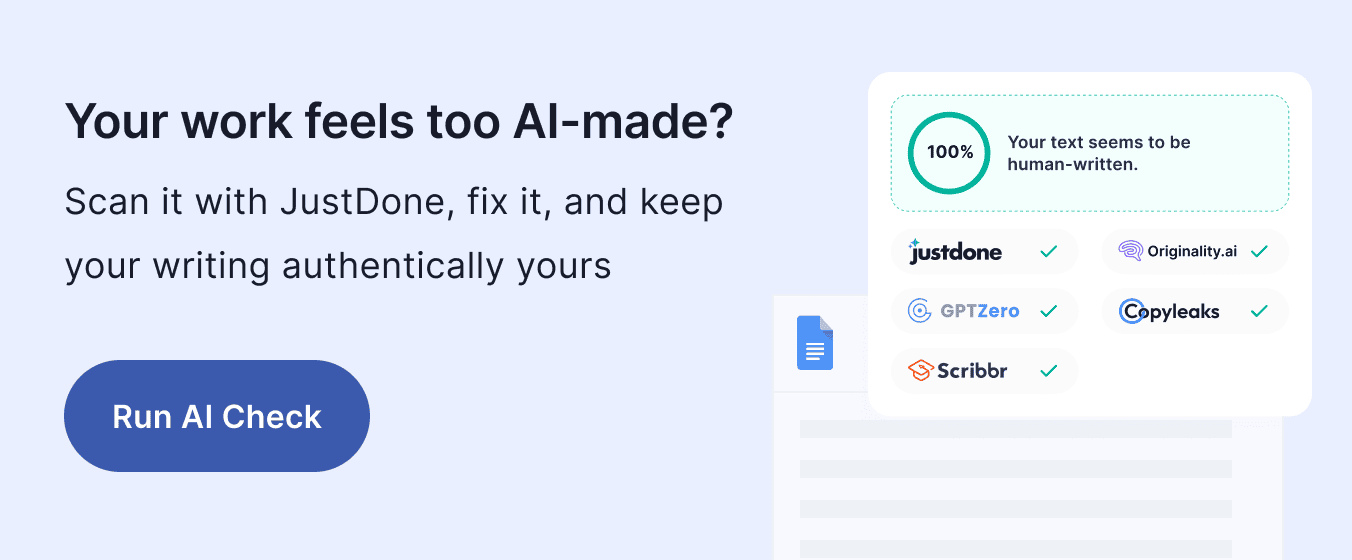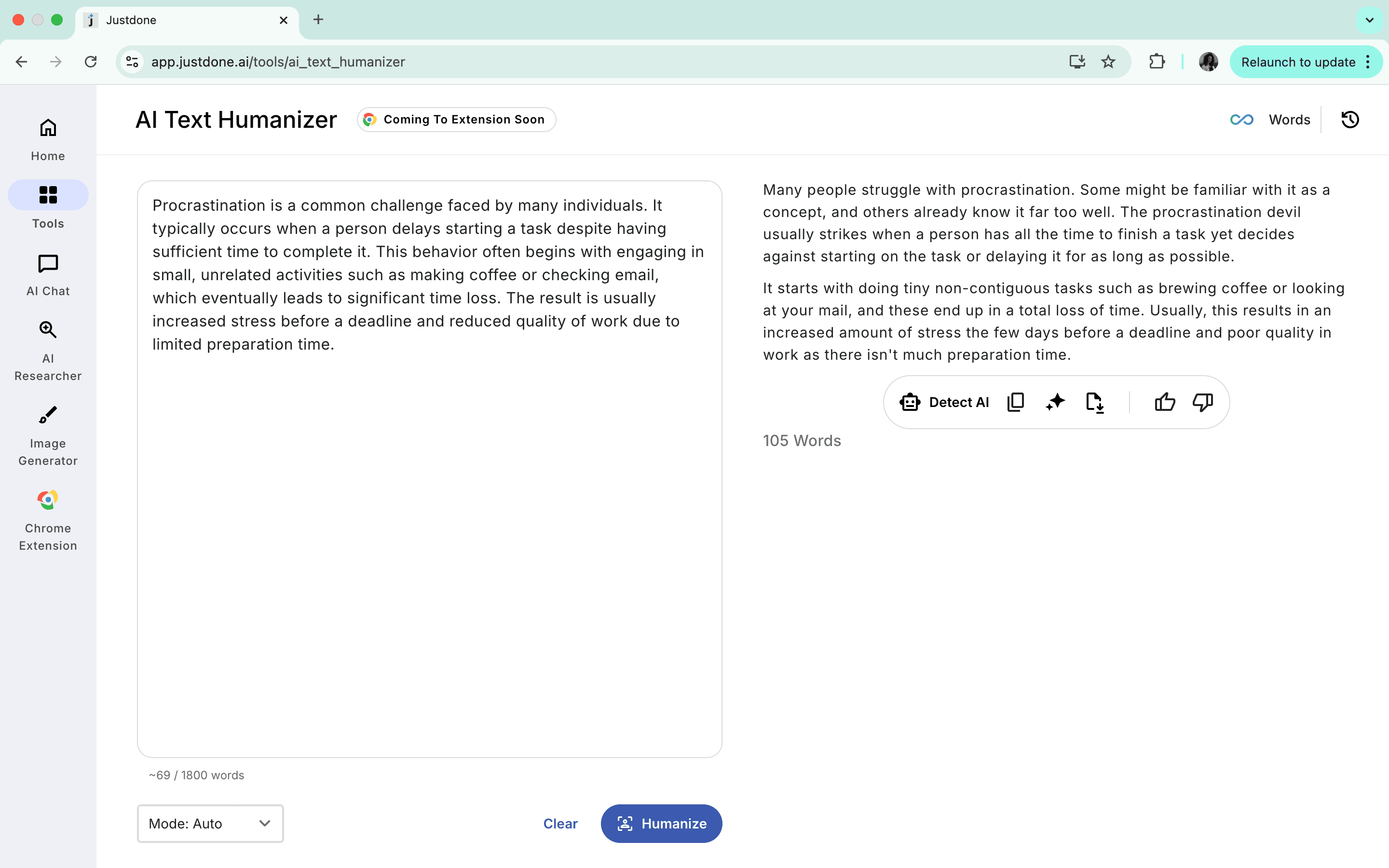Frankly speaking, using AI tools like ChatGPT to help with assignments is now as common as Googling a source. But professors are catching on fast, and so are detection tools. If you submit something that sounds like a machine wrote it, you’re taking a real risk. I’ve been there, and I’ve figured out what actually works to make your writing feel like you.
In this guide, I’ll break down tips how to avoid AI detection in writing and how you can still use AI in a smart, ethical, and effective way. This isn’t about beating the system; it’s about learning to use the system better instead.

Why It’s Important to Bypass AI Detection (The Right Way)
According to a 2024 Stanford study, 42% of college instructors surveyed said they used AI detection software during grading. That number keeps growing. Not only teachers, but also recruiters and content platforms increasingly use AI detectors to spot machine-generated text. If your work gets flagged, it can raise questions about originality. Simply asking ChatGPT to “sound more human” isn't enough, because AI checkers evolve fast and can identify even the latest GPT-5.0 outputs. That's why learning how to avoid AI detection in writing is essential for everyone today.
Aсtionable Tips to Avoid AI Detection in Writing Assignments
I don’t want to pretend my recommendations are the last truth you can find about bypassing AI detectors. But this list usually helps me use AI without raising red flags:
- Let AI brainstorm, but then rewrite everything.
I never use AI-generated text as-is. I treat it like a messy outline. Once I get a base, I go in and rewrite everything in my own words, with my own tone. It might seem like the most important tip, but there's more to it. Here's another trick. - Use a paraphraser to break patterns.
Tools like JustDone’s Paraphrasing Tool are gold. When AI outputs something too stiff or repetitive, I run it through the tool and tweak the result. It helps shake that robotic feel without having to start over. - I inject moments that only a human would write.
Specific examples or anecdotes help rewrite ChatGPT to avoid detection. For example, if I’m writing about stress during finals, I’ll drop in how I forgot my own name during an oral exam. Or the time I made pasta at 2 a.m. just to feel normal again. That’s not something AI would think to add, and it makes the work feel mine. - I mess with rhythm and tone.
AI likes smooth, tidy sentences. I like to break rules. Short thoughts. Side notes. Questions that interrupt. Like this. That contrast makes it feel more like me, less like code. But don't use this style if you don't like it. Be yourself - this is the most important recommendation to avoid AI detection in writing assignments, after all.
How I Rewrite Generated Text to Avoid AI Detection in Practice
This approach completely changed the way my writing came across. I've found that mastering AI humanizer is the most reliable method to avoid AI detection in writing. I use JustDone's humanizer because unlike simple paraphrasers, it doesn't just swap words, but reshapes sentence patterns, tone, and flow that may sound robotic. Most importantly, you can still keeping your original message unchanged.
From my experience with AI writings that need to pass strict checks, I recommend using the following steps.
First, start by passing your ChatGPT-generated text in its raw form into the humanizer. Don't pre-edit too much, because the tool works best when it has the unchanged patters that AI detectors look for. Once processed, review the result carefully. The best practice is to keep the structural rewrites that break AI patterns but customize style changes to match your own voice. Here's what it looks like:

Use the “layered humanizing” approach for high-stakes assignments. First, run your text through AI humanizer. Then, inject personal detailes, life experience, and informal things that AI would never add.
For example, I once used AI to draft a paragraph on procrastination. The result looked like this:
"Procrastination is a problem many students face. It affects their grades and increases stress levels. Time management strategies can help reduce procrastination."
It made the point, but it sounded like a line from a textbook. So I rewrote it with AI humanizer and my own details:
"I used to think procrastination meant I was just lazy. Then I pulled three all-nighters in one week and still failed a quiz. What changed? I stopped trying to be perfect and started planning backwards from the deadline. It’s not flawless, but it keeps me focused."
The core message stayed the same, but the voice was completely different. And that’s what matters when you’re trying to write in a way that feels real.
Another trick is to deliberately keep minor imperfections after humanizing. AI often sounds too clean, and this raises suspicion. A short fragment sentence, an informal “but” at the start of a line, or even slightly uneven sentence lengths can all help you bypass AI detection.
Here’s a trick I use all the time: I’ll paste in my AI draft and ask, “What parts of this sound most robotic?” ChatGPT will usually flag the blandest bits. Then I go in and rewrite those chunks.
It’s like editing with a second brain, but I stay in control. And finally, I recommend combining the humanizer with JustDone's AI Detector in real time. It's easy in their ecosystem. This loop (humanize ChatGPT text, then personalize, and check for AI) is the fastest and safest way I know to rewrite generated text to avoid AI detection.
What AI Detectors Catch and How I Make My Writing Feel Real
When I first started using AI tools, I noticed something strange. The writing looked clean and grammatically correct, but it didn’t sound like me. It was too polished, too even, too impersonal. That’s exactly what AI detectors pick up on. They’re designed to spot writing that feels synthetic rather than human.
One thing that gives it away is sentence structure. AI tends to produce lines that are all the same length, one after another. To break that pattern, I started writing in a way that mimicked how I speak. Some sentences were long, others short. Sometimes I’d start with a word like "And" or "But" just because it felt natural. This rhythm made the writing flow like a real conversation.
Transitions were another giveaway. AI loves to use formal phrases like "Moreover" or "Consequently." But that’s not how most of us speak or even write casually. So instead of forcing transitions, I let the ideas move naturally. Sometimes I’d use something informal like "Also" or just let the thought carry itself without any connector at all.
Another thing I noticed was the lack of emotion. AI text might get the facts right, but it rarely captures what something actually feels like. That’s where I lean in. If I’m writing about stress or burnout, I describe the moment it hit me, not just the general concept. It’s the difference between saying you felt overwhelmed and explaining what it was like when your mind went completely blank in the middle of a group presentation.
I also pay close attention to vocabulary. AI often uses language that sounds stiff or overly formal. So I started replacing those words with more natural alternatives. I used contractions and simple phrases. If I was writing a blog or something casual, I might even add an emoji or a bit of slang, depending on the tone. It made the writing feel more grounded and less robotic.
Final Thoughts: How to Avoid AI Detection in Writing and Still Sound Like You
Learning how to avoid AI detection in writing isn’t about cheating. It’s about learning to collaborate with tech and still sound like a real person. That’s a skill worth building.
You’re not just writing to finish an assignment. You’re writing to be understood. So trust your voice, humanize your tools, and make your work something only you could’ve written.
If you’re ever stuck, tools like JustDone’s AI Detector and Humanizer can help you polish your work and stay authentic, without setting off alarms.
Own your writing. Edit like it matters. Because it does.